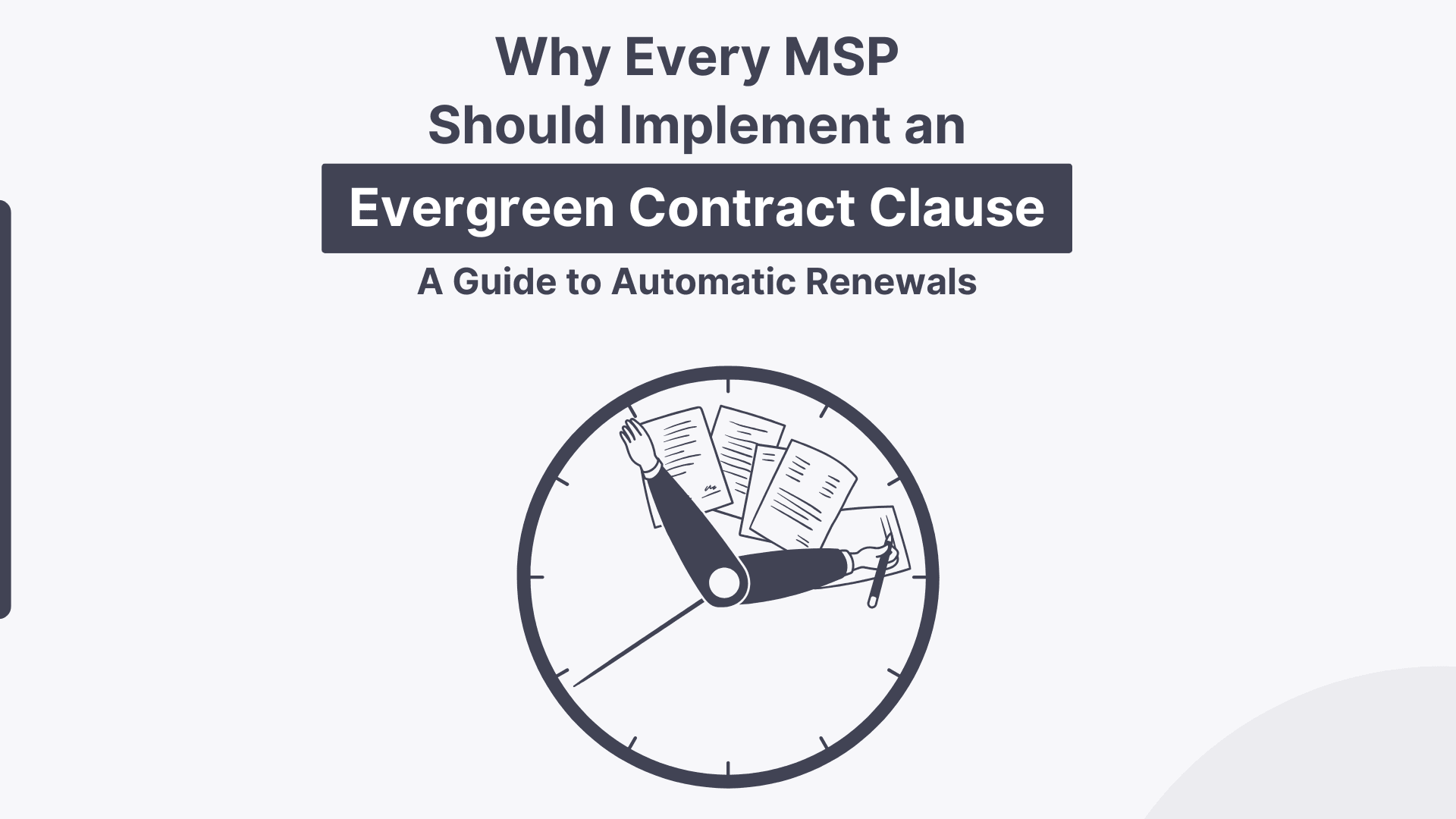“You want to be on top of your business,” emphasizes Brandi Bonds from Next Level Now, highlighting how MSPs can maximize revenue through smart contract management. “If you don’t have an evergreen clause, which I recommend… you’re missing opportunities to connect with your customers and potentially upsell or add on if their business has grown.”
Understanding Evergreen Contracts: Definition and Key Concepts
An evergreen contract clause automatically renews a contract after its initial term unless either party gives notice to terminate. This differs from standard auto-renewal contracts, which typically renew for specific terms and durations. While an auto-renewal contract might extend for a set period, like one year, evergreen contracts continue indefinitely until terminated.
The foundation of these agreements rests on several key elements:
- Initial Term: The first contract period that establishes the service relationship
- Automatic Renewal Process: Continuation of service without manual intervention
- Notice Requirements: Specified timeframes for termination requests
- Mutual Agreement Framework: Consent mechanisms for both parties
- Renewal Terms: Conditions under which the contract continues
For MSPs, these contracts create a continuous service agreement that maintains revenue stability while reducing administrative overhead. The absence of a defined contract period doesn’t automatically classify an agreement as evergreen—specific terms must be outlined in the agreement.

The Business Case and ROI for Evergreen Clauses
As Bonds explains in her revenue maximization strategies, evergreen contracts create natural opportunities for business growth through three key advantages:
Revenue Predictability
Implementing evergreen contracts establishes stable monthly recurring revenue (MRR), enabling better cash flow forecasting and eliminating revenue gaps between contract periods. As Bonds notes from her experience, “for every fixed fee contract I have, I know I’m going to get 3 percent or 5 percent of revenue in a project for those customers.”
Operational Efficiency
MSPs typically see a 15-20% reduction in administrative costs after implementing evergreen contracts. This improvement comes from:
- Decreased administrative burden in contract management
- Streamlined renewal processes
- Reduced paperwork and negotiation time
- More resources available for service delivery
Enhanced Client Relationships
These contracts transform client interactions by:
- Creating regular touchpoints for relationship nurturing
- Providing natural opportunities for service reviews
- Establishing platforms for strategic growth discussions

The Psychology of Contract Management
Most resistance to evergreen contracts stems from client misconceptions rather than actual contract terms. Clients often express concerns about:
- Being locked into services indefinitely
- Losing negotiating power
- Reduced flexibility in service adjustments
In reality, well-structured evergreen contracts protect both parties while maintaining flexibility. Successful MSPs address these concerns through:
- Clear Documentation: Creating comprehensive materials explaining benefits and protections
- Explicit Rights: Detailing termination procedures and service level guarantees
- Price Protection: Including mechanisms for fair rate adjustments
- Strategic Timing: Introducing evergreen terms during initial contract discussions
Implementation Best Practices
Communication Framework
Effective implementation starts with transparent communication. MSPs should:
- Clearly outline automatic renewal terms and conditions
- Specify notice periods for any contract changes
- Detail rate adjustment mechanisms and schedules
- Maintain regular communication about service reviews
Client-Centric Approach
Focus on demonstrating value through:
- Regular service performance reviews
- Proactive technology recommendations
- Clear documentation of delivered benefits
- Continuous alignment with client business goals
Legal and Timing Considerations
Protect all parties by:
- Ensuring compliance with state and federal regulations
- Implementing appropriate notice periods (typically 30-90 days)
- Aligning renewal dates with fiscal planning
- Scheduling strategic review meetings before auto-renewal dates
Growth Strategy Integration
Bonds emphasizes the connection between contract management and revenue growth. Successful MSPs integrate three core elements into their growth strategy:
Regular Business Reviews
Transform standard check-ins into strategic planning sessions by:
- Sharing quantifiable performance metrics
- Discussing emerging technology needs
- Identifying potential service gaps
- Planning future technology investments
Service Package Evolution
Drive growth through strategic service development:
- Maintain detailed records of client requests and pain points
- Customize upgrades based on specific business needs
- Develop solutions that align with client growth plans
- Create exclusive add-on packages for evergreen clients
Client Success Planning
Build long-term partnerships through:
- Understanding client industry trends
- Creating multi-year technology roadmaps
- Aligning services with business objectives
- Regular strategic planning sessions

Maximizing Cash Flow: The Payment Automation Advantage
While evergreen contracts create the legal framework for ongoing services, they’re only as effective as your ability to collect payments consistently. As Brandi Bonds notes, “You always want to try and negotiate terms where you are not paying your vendors until your customers pay you, unless you have enough cash flow to do that.” This principle of cash flow management becomes significantly easier with automated payment collection.
Implementing a robust payment strategy alongside your evergreen contracts includes:
- Payment Portal Integration: Give clients 24/7 access to manage their payment methods and view invoices
- Stored Payment Methods: Securely maintain credit card and ACH information for automated billing
- Failed Payment Recovery: Automated retry logic and payment method update requests
- Payment Analytics: Track collection metrics and identify trends in payment behavior
“If you don’t have cash, it’s really hard to run a business,” Bonds emphasizes. MSPs using Alternative Payments’ payment portal typically see a 70% reduction in accounts receivable work while maintaining more consistent cash flow. The platform seamlessly integrates with evergreen contracts to ensure payments continue smoothly through renewal periods.
Most importantly, automated payments transform potentially awkward collection conversations into opportunities for value-focused discussions with clients. Rather than chasing payments, your account management meetings can focus on strategic planning and service improvements.
Implementation Roadmap
Phase 1: Assessment (Weeks 1-2)
Begin with a thorough evaluation of your current contract landscape:
- Audit existing agreements
- Identify renewal patterns
- Map client relationships
- Analyze renewal costs and inefficiencies
Phase 2: Planning (Weeks 3-4)
Develop your implementation strategy:
- Create standardized evergreen clause language
- Prepare client communication materials
- Design implementation timeline
- Establish success metrics
Phase 3: Pilot Program (Months 1-2)
Test your approach with a select group:
- Choose representative clients
- Implement new contracts
- Collect feedback
- Refine processes based on results
Phase 4: Full Rollout (Months 3-6)
Scale your successful pilot:
- Train account managers
- Implement across client base
- Monitor key metrics
- Adjust processes as needed

Addressing Common Challenges
Managing Client Resistance
Overcome objections through:
- Clear value propositions
- Transparent benefit explanations
- Flexible transition options
- Regular communication
Internal Process Alignment
Ensure organizational readiness by:
- Creating detailed workflows
- Implementing automation tools
- Conducting regular team training
- Establishing clear communication channels
Contract Transitions
Smooth the conversion process through:
- Phased implementation plans
- Strategic timing of conversions
- Clear transition communications
- Flexible legacy client options
Conclusion
Implementing evergreen contracts requires careful planning and execution, but as Bonds notes, these contracts provide invaluable opportunities to “connect with your customers and potentially upsell or add on if their business has grown.” Begin by auditing your current contracts and identifying opportunities for conversion to evergreen agreements. This strategic shift not only streamlines operations but positions your MSP for sustainable growth and stronger client relationships.
Want to learn more about financial planning and cash flow management for your MSP? Watch the full recording of our December 19, 2024 Office Hours session on Budgeting and Forecasting featuring Brandi Bonds, Managing Partner at Next Level Now. In this engaging discussion, Brandi shares practical insights about resource allocation, acquisition modeling, and strategic cost management that can help your MSP thrive in 2024.

